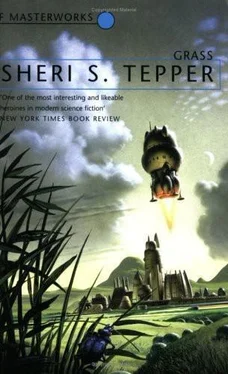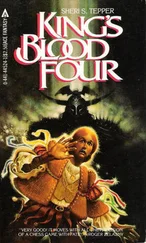Sheri Tepper - Grass
Здесь есть возможность читать онлайн «Sheri Tepper - Grass» весь текст электронной книги совершенно бесплатно (целиком полную версию без сокращений). В некоторых случаях можно слушать аудио, скачать через торрент в формате fb2 и присутствует краткое содержание. Город: London, Год выпуска: 2002, ISBN: 2002, Издательство: Gollancz, Жанр: Фантастика и фэнтези, на английском языке. Описание произведения, (предисловие) а так же отзывы посетителей доступны на портале библиотеки ЛибКат.
- Название:Grass
- Автор:
- Издательство:Gollancz
- Жанр:
- Год:2002
- Город:London
- ISBN:9781857987980
- Рейтинг книги:4 / 5. Голосов: 1
-
Избранное:Добавить в избранное
- Отзывы:
-
Ваша оценка:
- 80
- 1
- 2
- 3
- 4
- 5
Grass: краткое содержание, описание и аннотация
Предлагаем к чтению аннотацию, описание, краткое содержание или предисловие (зависит от того, что написал сам автор книги «Grass»). Если вы не нашли необходимую информацию о книге — напишите в комментариях, мы постараемся отыскать её.
Grass — читать онлайн бесплатно полную книгу (весь текст) целиком
Ниже представлен текст книги, разбитый по страницам. Система сохранения места последней прочитанной страницы, позволяет с удобством читать онлайн бесплатно книгу «Grass», без необходимости каждый раз заново искать на чём Вы остановились. Поставьте закладку, и сможете в любой момент перейти на страницу, на которой закончили чтение.
Интервал:
Закладка:
“What kind?” she asked. “Of trees, what kind?” The young, skinny brother answered, eagerly telling her what Mainoa had told him. “A tree found only in the swamp forest, ma’am. Some of the wood was still here when the town was uncovered. Preserved, it was. They examined the remains, and they weren’t a kind of tree that grows out here. A fruit tree, they think it was.”
Fronting on the narrow street were carved housefronts and wooden doors, the doors carved, so Brother Mainoa instructed them, with scenes of religious life among the Arbai.
“Religious?” Father Sandoval asked. He was too well schooled to sneer, but his doubt was manifest — Brother Mainoa shrugged. They were scenes definitely mysterious, possibly mystical. What were they doing in those carvings? How could one be sure? What meant these figures offering tiny boxes or cubes to one another, these figures in procession? What meant these kneeling creatures, seeming to watch a grass peeper with expressions of awe upon their faces? The unknown artist had carved the peeper as though it was almost spherical and bracketed it with two hounds, noses pointed upward, surrounding the design with vines and leaves as all the designs were surrounded with vines and leaves. Personally, Brother Mainoa thought the carvings were religious. He smiled at Father Sandoval, daring him to disagree.
Father Sandoval smiled in return, keeping his opinion to himself. Father James looked from face to face, fretfully.
On another door two Hippae were back to back, kicking clods of earth at one another. Or perhaps at the strange structure between them. Was it a sculpture? Or a machine? Beside them the Arbai stood, solemnly watching. What did it mean? And how could one tell what details might have been lost when the doors were broken?
For they were broken. Splintered. Fragmented and crushed inward upon their hinges. Inside the excavated rooms — simple rooms, floored in the same stone as the streets, walled with what Brother Mainoa said was polymerized earth, with wide windows which had once looked out onto the prairies — inside those rooms were bones, hides, scales, mummified forms of people who had lived here once. Arbai. Near enough human-shaped to evoke human responses when humans saw their agony.
There were mouths open as though screaming. Empty eye sockets gazing upon horror. Here an arm and there the body, the remaining three-fingered, double-thumbed hand reaching toward the detached limb as though to reclaim it, possess it, at least to die whole — a denial of whatever horrible thing was happening.
Young ones, or at least small ones, torn in half, with adults clutching what remained to their breasts. Elsewhere, time had disintegrated the bodies and there were only piles of bones and piles of the glossy scales which had covered their hides. Everywhere the same, down every street, in every house.
Marjorie shut her eyes, hearing voices the next street over. A slippery language, full of sibilants, but punctuated with very human-sounding laughter.
“Are there other friars here?” she asked. “Digging? Working?”
“None today.” Brother Mainoa smiled, regarding her curiously. “What you hear is what you hear? The sounds of this city, perhaps? Or is it only the wind? How many times I have asked myself that question. ‘Mainoa,’ I say. ‘Is it only the wind?’ Or is it the sound of these people, Lady Westriding?” So he had already known her name.
Tony said, “I get the feeling that this place is… well, intentionally strange. For this world, I mean.”
Brother Mainoa gave him an approving look. “So I have felt, young sir. Intentionally made, by these poor creatures, a little like their own home place, perhaps?”
“There are many strange things about Grass,” Marjorie agreed, looking away from a screaming face. “Dr. Bergrem, in the town, has written about some things that make the planet unique. There is something our cells use, some long name I forget, which exists in a unique form here on Grass. She’s been studying it.”
“On any other world, the doctor would be renowned,” Brother Mainoa said. “Her reputation is greater than the people here know.”
“She could probably explain these sounds,” Marjorie remarked, fighting down an overwhelming terror and despair, trying to convince herself she did not hear murmured conversation in wholly unhuman voices, musical voices with a burbling, liquid sound. “Have you asked her?”
“I have reported the effects,” Brother Mainoa said. “I think the authorities believe I imagine them. So far no one has come to see whether I imagine them or not.”
Father Sandoval, seeing Marjorie’s distress, decided to warn her off. “Such places as this occasion superstitious awe in the unwary. We must be alert to protect ourselves from such, Marjorie. These were merely creatures, now extinct. There must have been some central business or supply area. These houses seem almost rural. They lack an urban feeling.”
“So it is with all Arbai cities or towns,” said Brother Mainoa. “Though we diggers know they traveled through space — perhaps in ships as we do, though we have found none, or by some other means — we know also they chose not to live in great aggregations as we humans often do. We have found no town capable of holding more than a few thousand or so of them. On most worlds there are several towns of that size, but never many.”
“And here?” Marjorie asked.
“This is the only one we have found on Grass.”
Father Sandoval frowned. “It is not a subject I know much about. Is it known where their home world was?”
Brother Mainoa shook his head. “Some think Repentance because there are several such cities on Repentance. I have not heard that anyone knows for sure.”
“Somewhere there could be Arbai still living, then?” Father James mused, kicking at a bit of protruding stone.
The Brother shrugged. “Some believe these dead towns were only outposts, that their cities will yet be found elsewhere. I don’t know. You asked about a business or market section in this town. What we assume is the market section is down this street to the left. At least, the structures there do not seem to be dwellings.”
“Shops?” Father Sandoval asked. “Storerooms?”
Mainoa shrugged. “There is an open space, a plaza. With three-sided structures that could have been booths for a market. There is a building full of jars of many sizes and shapes. A building full of baskets. A central dais in the plaza, surmounted with something that could be a machine, a sculpture, a place for posting notices. Perhaps it was an altar, or a place for a herald to stand, or a place to sit while watching the stars. Or even a stage for acrobatic display. Who knows? Who can say? One building is full of their books, books which look very much as our own did, a century or so ago, before we had scanners and decks and screens.”
“Bound volumes?” Marjorie asked.
“Yes. I have a team of penitents taking images of each page. I should say I have them intermittently. When there is nothing better for them to do. Though I am here much of the time, I have a crew at work only now and again. Copying the books is dull work, and lonely, but necessary. Eventually, a full set of copies will be available at Sanctity and at some major schools, like the University at Semling Prime.”
“But no translation.” Marjorie stared through an open door at the carnage within, willing it to be otherwise.
“None. Line after line, page after page, signs made of curving lines, intertwined. If there were something we could call a church, we could look for a repeated sequence and hope it meant ‘God.’ If there were a throne, we could look for the word ‘King.’ If there were words on the door carvings, we could feed the context into our computers, which might make sense of them. If there were even pictures in the books… I will show you some of the books before you leave.”
Читать дальшеИнтервал:
Закладка:
Похожие книги на «Grass»
Представляем Вашему вниманию похожие книги на «Grass» списком для выбора. Мы отобрали схожую по названию и смыслу литературу в надежде предоставить читателям больше вариантов отыскать новые, интересные, ещё непрочитанные произведения.
Обсуждение, отзывы о книге «Grass» и просто собственные мнения читателей. Оставьте ваши комментарии, напишите, что Вы думаете о произведении, его смысле или главных героях. Укажите что конкретно понравилось, а что нет, и почему Вы так считаете.












